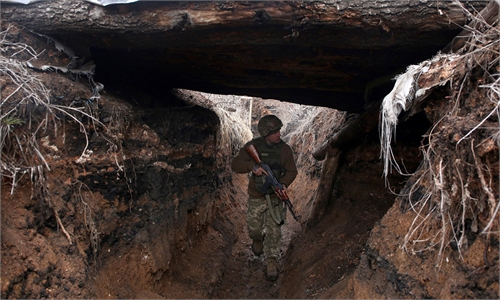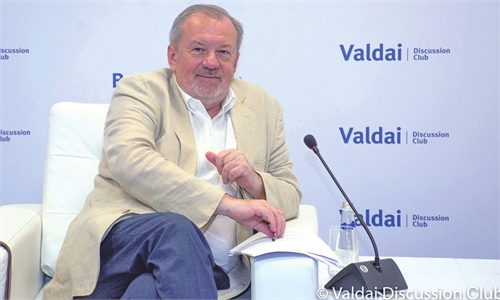
Xinhua file photos of the Kremlin in Moscow (L) and the NATO headquarters in Brussels
Russia will hold three successive security dialogues with the US, NATO and the Organization for Security and Co-operation in Europe respectively starting from Monday.The core issue of the talks with the US and NATO is whether NATO should expand eastward. The two sides are at loggerheads with respect to this topic. NATO leaders say it has never promised not to expand eastward. For Russia, a representative move of NATO's eastward expansion is Ukraine's possible accession to NATO, which means that Ukraine will be included in the US-led military deployment system. That would allow the US to place offensive weapons, including strategic missiles, in the territory of any NATO member state such as Ukraine. This will make the security situation for Russia even more serious.
There are two possible ways for Ukraine to join NATO: One is to join NATO without being a nominal member. There is a high possibility of forming a quasi-alliance based on arms sales and military exercises. The other is to fully join NATO in accordance with due procedures, the possibility of which is small at present.
From a strategic perspective, there must be special considerations lying behind Washington's strong concerns about Ukrainian affairs. The US' geopolitical goal is to turn Ukraine into a "conundrum" that will never be solved, or into an arena for great power rivalry. The US will not allow Russia to "annex" Ukraine because if Ukraine falls to Russia, the US will lose an important tool to check Russia and play a role in the regional situation.
On the other hand, deterring Russian military action is also a priority for the US and NATO. The US needs to keep regional tensions without allowing relations to collapse and to escalate into a war. The US can no longer afford to engage in a large-scale war, especially with Russia, which is a nuclear power. So by warning of comprehensive economic sanctions against Russia "if it invades Ukraine," the US wants to show its resolve and that it will not allow Russia to repeat its adventure in Crimea in 2014.
From Moscow's point of view, however, resolving the Ukraine issue is no longer just a game between the two countries. Russia wants binding guarantees to prevent the eastward expansion of NATO and the deployment of offensive missile systems in its neighbor.
Based on their respective positions, the US and Russia are indeed at loggerheads. Both the US and Russia are using mixed strategies to play games with each other, and there is little possibility of direct military conflicts or military conflicts by agents.
The US uses the Ukrainian issue to achieve several goals. First, to create war panic by vigorously engaging in brinkmanship. Second, let Ukraine act as a pawn to check and balance Russia. By nominally helping Ukraine, the US is actually making Ukraine work for the US. Third, form a situation in which the EU and Russia balance each other, while the US can play a leading or dictating role in the crisis. The US hopes to create "collective anxiety" among NATO allies around Russia and force them to deepen their security dependence on the US to curb Europe's pursuit of strategic autonomy. Fourth, the Ukraine issue is used to deter Russia and increase US leverage in its dialogue with Russia.
Russian President Vladimir Putin has two cards to play against the US. One is military intervention in Ukraine. This can be seen as Russia's response to the US' brinkmanship strategy. The other is military intervention in the Pacific to counterbalance the Indo-Pacific Strategy of the US.
The US currently wants to tie Russia's main attention to the Western Front, while keeping it distracted from the East. Only in this way can the effective implementation of its Indo-Pacific Strategy be ensured. It's certain the US is now not in a position to intervene directly with military forces. It is the US' fixated aim to use the crisis to maintain its dominance of the Eurasian center.
Historically, when the US is in strategic contraction, it often tends to create crises in strategic areas of concern, so that its allies and adversaries can balance each other and the US can maintain balance to the greatest extent offshore. From this point of view, the Ukraine situation may become a long-term and strategic issue.
The author is vice president of China Foreign Affairs University.
The article was translated by Zhang Yuzheng of East China Normal University.



